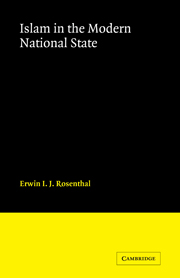Book contents
- Frontmatter
- Contents
- Introduction
- Acknowledgements
- Abbreviations
- Note on transliteration
- PART I CONTEMPORARY ISLAM IN CRISIS AND TRANSITION
- PART II ISLAM IN THE MODERN NATIONAL STATE
- SECTION I CONSTITUTIONAL ISSUES
- 8 The Islamic Republic of Pakistan
- 9 Islam in Malaya
- 10 Some observations on Islam in Iran and Turkey
- 11 Islam in Tunisia and Morocco
- SECTION 2 CHANGES IN LAW AND THE EMANCIPATION OF WOMEN
- SECTION 3 THE PLACE OF ISLAM IN NATIONAL EDUCATION
- Epilogue
- Notes
- Select Bibliography
- Index
8 - The Islamic Republic of Pakistan
Published online by Cambridge University Press: 05 September 2013
- Frontmatter
- Contents
- Introduction
- Acknowledgements
- Abbreviations
- Note on transliteration
- PART I CONTEMPORARY ISLAM IN CRISIS AND TRANSITION
- PART II ISLAM IN THE MODERN NATIONAL STATE
- SECTION I CONSTITUTIONAL ISSUES
- 8 The Islamic Republic of Pakistan
- 9 Islam in Malaya
- 10 Some observations on Islam in Iran and Turkey
- 11 Islam in Tunisia and Morocco
- SECTION 2 CHANGES IN LAW AND THE EMANCIPATION OF WOMEN
- SECTION 3 THE PLACE OF ISLAM IN NATIONAL EDUCATION
- Epilogue
- Notes
- Select Bibliography
- Index
Summary
In isolating the Islamic question from the other problems facing a newly independent Muslim state we must be clear from the outset that political consolidation, economic viability and social advance—to be brought about by radical reforms in all aspects of society—take precedence over the problem of the place of Islam in public life. And yet, Islamic teachings and institutions, from the formative period to the threshold of the present time, have a bearing on the more practical tasks of securing physical survival and development, social organisation and cultural activity. The importance of Islam as a state- and nation-building factor naturally varies from country to country and depends on their history and on the circumstances of their emergence as sovereign national states.
It was, therefore, necessary to describe the national movements and the views of leading exponents of the several trends discernible in contemporary Islam in order to understand the forces at work today in various Muslim countries.
Disagreement on the nature of the state—Islamic or Muslim, i.e. modern national—apart, all writers, statesmen and politicians with their followers are agreed on the imperative need to implement social justice as taught by Islam in the new society they intend to build up.
Social justice is today a universal demand whatever the inspiration for its realisation is. We are, therefore, justified in asking whether the practice of social justice in modern Muslim states makes them Islamic irrespective of the form in which it is practised, as zakāt, enjoined in the Qur'an and defined in the Sharī‘a, or through the legislation of a modern welfare state.
- Type
- Chapter
- Information
- Islam in the Modern National State , pp. 181 - 286Publisher: Cambridge University PressPrint publication year: 1965



